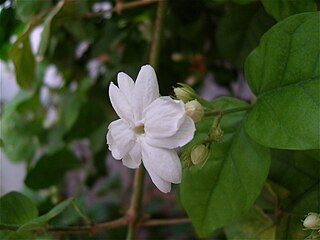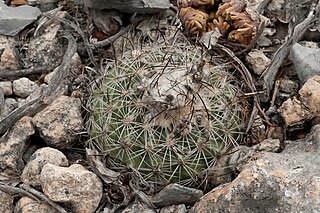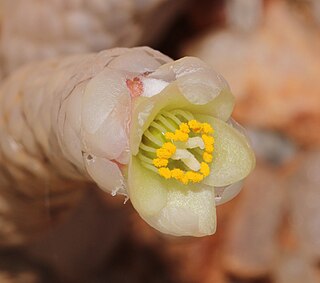
Alders are trees comprising the genus Alnus in the birch family Betulaceae. The genus comprises about 35 species of monoecious trees and shrubs, a few reaching a large size, distributed throughout the north temperate zone with a few species extending into Central America, as well as the northern and southern Andes.

Jasmine is a genus of shrubs and vines in the olive family of Oleaceae. It contains around 200 species native to tropical and warm temperate regions of Eurasia, Africa, and Oceania. Jasmines are widely cultivated for the characteristic fragrance of their flowers. A number of unrelated plants contain the word "jasmine" in their common names.

Ulex is a genus of flowering plants in the family Fabaceae. The genus comprises about 20 species of thorny evergreen shrubs in the subfamily Faboideae of the pea family Fabaceae. The species are native to parts of western Europe and northwest Africa, with the majority of species in Iberia.

Ceanothus is a genus of about 50–60 species of nitrogen-fixing shrubs and small trees in the buckthorn family (Rhamnaceae). Common names for members of this genus are buckbrush, California lilac, soap bush, or just ceanothus. "Ceanothus" comes from Ancient Greek: κεάνωθος (keanōthos), which was applied by Theophrastus to an Old World plant believed to be Cirsium arvense.

Coriaria is the sole genus in the family Coriariaceae, which was described by Linnaeus in 1753. It includes 14 species of small trees, shrubs and subshrubs, with a widespread but disjunct distribution across warm temperate regions of the world, occurring as far apart as the Mediterranean region, southern and eastern Asia, New Zealand, the Pacific Ocean islands, and Central and South America.

Jasminum sambac is a species of jasmine native to tropical Asia, from the Indian subcontinent to Southeast Asia. It is cultivated in many places, especially West Asia, South Asia and Southeast Asia. It is naturalised in many scattered locales: Mauritius, Madagascar, the Maldives, Christmas Island, Chiapas, Central America, southern Florida, the Bahamas, Cuba, Hispaniola, Jamaica, Puerto Rico, and the Lesser Antilles.

Helianthemum nummularium is a species of rock-rose (Cistaceae), native to most of Europe.

Jasminum grandiflorum, also known variously as the Spanish jasmine, Royal jasmine, Catalan jasmine, Sicilian jasmine, is a species of jasmine native to South Asia, the Arabian peninsula, East and Northeast Africa and the Yunnan and Sichuan regions of China. The species is widely cultivated and is reportedly naturalized in Guinea, the Maldive Islands, Mauritius, Réunion, Java, the Cook Islands, Chiapas, Central America, and the Caribbean.It is closely related to, and sometimes treated as merely a form of, Jasminum officinale. The plant is known as "saman pichcha" or "pichcha" in Sri Lanka.

Anthyllis vulneraria, the common kidneyvetch, kidney vetch or woundwort is a medicinal plant native to Europe. The name vulneraria means "wound healer".

Turbinicarpus saueri is a species of plant in the family Cactaceae.

Turbinicarpus schmiedickeanus is a species of plant in the family Cactaceae.

Artemisia campestris is a common and widespread species of plants in the sunflower family, Asteraceae. It is native to a wide region of Eurasia and North America. Common names include field wormwood, beach wormwood, northern wormwood, Breckland wormwood, boreal wormwood, Canadian wormwood, field sagewort and field mugwort.
Jasminium abyssinicum is a species of jasmine, in the family Oleaceae.

Jasminum didymum is a species of scrambling vine or low shrub. It is native to insular Southeast Asia from Java to the Philippines, as well as Australia, as well as some islands in the Pacific. Jasminum didymum occurs naturally in habitats from rainforests to arid and semi-arid shrublands.

Streptocarpus ionanthus is a species of Streptocarpus in the section Saintpaulia, commonly known as an African violet. It is native to eastern and southwestern Tanzania.

Jasminum laurifolium, the angel-wing jasmine, is a species of flowering plant in the genus Jasminum, native to the Himalayas, Nepal, Assam, Bangladesh, Tibet, south-central and southeast China, Hainan, Myanmar, and Thailand. Its putative form Jasminum laurifolium f. nitidum has gained the Royal Horticultural Society's Award of Garden Merit.

Jasminum adenophyllum, commonly known as the bluegrape jasmine, pinwheel jasmine, or princess jasmine, is a species of jasmine, belonging to the olive family.

Anacampseros papyracea is a species of succulent plant in the genus Anacampseros. It is endemic to Southern Africa.

















